[ad_1]
Zelenskiy urges Nato to protect nuclear facilities from ‘Russian sabotage’
Ukraine’s president, Volodymyr Zelenskiy, has appealed to Nato members to guarantee the protection of his country’s nuclear power plants from “Russian sabotage”.
In a video address to Nato’s parliamentary assembly in Madrid, he said:
All our nations are interested in not having any dangerous incidents at our nuclear facilities.
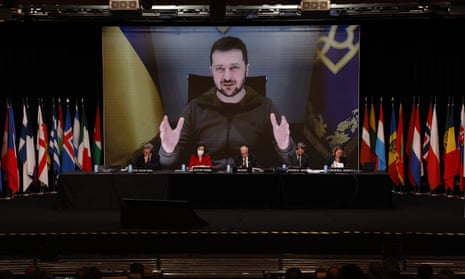
He added:
We all need guaranteed protection from Russian sabotage at nuclear facilities.
Zelenskiy also called for new EU sanctions against Russia over what he said was its “policy of genocide” as its forces bomb civilian infrastructure.
Key events
Closing summary
It’s nearly 9pm in Kyiv. Here’s where things stand:
-
Ukraine is to evacuate civilians from recently liberated areas of the Kherson and Mykolaiv regions. Residents of the two southern regions have been advised to move to safer areas in the central and western parts of the country, amid fears that the damage to infrastructure caused by the war is too severe for people to endure the winter.
-
The Kremlin said it was concerned by what it claimed to be repeated Ukrainian shelling of the Zaporizhzhia nuclear power plant. Ukraine’s Zaporizhzhia nuclear power plant, which is under Russian control, was rocked by shelling over the weekend, drawing condemnation from the UN nuclear watchdog which said such attacks risked a major disaster.
-
The head of Russia’s state-run atomic energy agency, Rosatom, warned of the risk of a nuclear accident at the Zaporizhzhia plant. Alexei Likhachev accused Ukraine of being willing to “accept” a “small nuclear incident”, adding that “everything must be done so that no one has in their minds to encroach on the safety of the nuclear power plant.”
-
Ukraine’s president, Volodymyr Zelenskiy, appealed to Nato members to guarantee the protection of his country’s nuclear power plants from “Russian sabotage”. Yuriy Sak, an adviser to Ukraine’s defence minister, said the shelling of the Zaporizhzhia plant was a Russian tactic that aimed to disrupt power supplies and “freeze Ukrainians to death”.
-
The UN nuclear watchdog will conduct an assessment of the Zaporizhzhia plant on Monday. The International Atomic Energy Agency (IAEA) has said the forces behind the shelling of the plant were “playing with fire”.
-
The World Health Organization (WHO) has warned that Ukraine’s health system is “facing its darkest days in the war so far”. WHO regional director for Europe, Dr Hans Henri P Kluge, called for a “humanitarian health corridor” to be created to all areas of Ukraine newly recaptured by Kyiv, as well as those occupied by Russian forces.
-
Ukraine’s prosecutor general office has said its officials have identified four locations where Russian forces tortured detainees in Kherson city. It said Russian forces “set up pseudo-law enforcement agencies” in pre-trial detention centres and a police station before troops withdrew from the southern Ukrainian city earlier this month.
-
Russian troops have been accused of burning bodies at a landfill on the edge of Kherson during their occupation of the region. Residents and workers at the site told the Guardian they saw Russian open trucks arriving to the site carrying black bags that were then set on fire, filling the air with a large cloud of smoke and a stench of burning flesh.
-
The Kremlin said that it would bring to justice those responsible for the alleged execution of Russian prisoners of war in Ukraine. Russia has accused Ukrainian soldiers of executing more than 10 Russian prisoners of war, citing a video circulating on Russian social media. Ukraine denies the claims. Kremlin spokesperson Dmitry Peskov also said there were no plans to call up more Russian soldiers to fight in Ukraine through a second round of mobilisation.
-
Russian forces launched almost 400 strikes on Sunday in Ukraine’s east as part of a campaign of artillery fire, president Volodymyr Zelenskiy said in a Sunday night address. “The fiercest battles, as before, are in the Donetsk region. Although there were fewer attacks today due to worsening weather, the amount of Russian shelling unfortunately remains extremely high,” Zelenskiy said.
-
Russian forces are constructing defensive positions partially staffed by poorly trained mobilised reservists around the Svatove sector in the Luhansk region in north-eastern Ukraine, according to the UK Ministry of Defence. With Russia’s south-western frontline now more readily defendable along the east bank of the Dnipro River, the Svatove sector is likely now a more vulnerable operational flank of the Russian force, the latest British intelligence report reads.
-
Forty-five countries and institutions will meet in Paris on Monday to pledge millions of euros of aid for Moldova, as fears mount that it could be further destabilised by the conflict in Ukraine. Moldova, which lies between Ukraine and Romania, has felt the effects of rising food and energy prices as well as an influx of thousands of refugees arriving in the country of about 2.5 million people.
That’s it from me, Léonie Chao-Fong, and the Russia-Ukraine war blog today. Thank you for following, I’ll be back tomorrow.
France’s president, Emmanuel Macron, has condemned the shelling of Ukraine’s Zaporizhzhia nuclear plant after a phone call with President Volodymyr Zelenskiy.
In a statement after the call, Macron said other nuclear plants at Rovno and Khmelnitski as well as the Nova Kakhovka dam had also been targeted.
He added that President Zelenskiy had thanked France for its continuous support for the Ukrainian army.
The Ukrainian leader said he “stressed the need of demilitarisation” at the Zaporizhzhia facility, and said the pair “discussed cooperation on ensuring Ukraine’s energy stability, in particular, protecting the system from air attacks”.
Had a call with @EmmanuelMacron. Informed about the situation on the battlefield and at 🇺🇦 nuclear plants. Stressed the need of demilitarization of #ZNPP. We also discussed cooperation on ensuring Ukraine’s energy stability, in particular, protecting the system from air attacks.
— Володимир Зеленський (@ZelenskyyUa) November 21, 2022
Here are some of the latest images we have received from the recently liberated city of Kherson, in southern Ukraine.
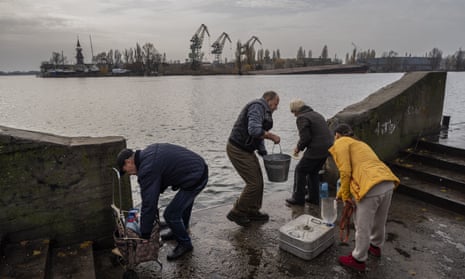
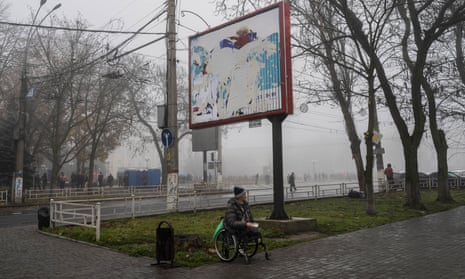
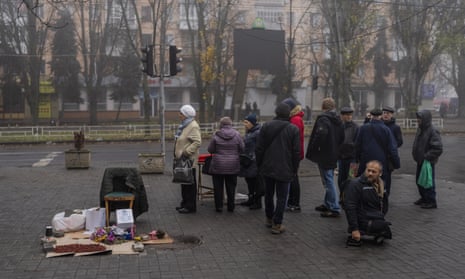
Luxembourg has said it will send additional armoured vehicles to Ukraine, according to its defence minister, François Bausch.
Ukraine to start evacuations in Kherson and Mykolaiv regions
Ukraine is to evacuate civilians from recently liberated areas of the Kherson and Mykolaiv regions, amid fears that the damage to infrastructure caused by the war is too severe for people to endure the winter.
Residents of the two southern regions, which were shelled regularly by Russian forces in the past months, have been advised to move to safer areas in the central and western parts of the country, said Ukraine’s deputy prime minister, Iryna Vereshchuk.
The government would provide transportation, accommodation and medical care, she added.
The evacuations come just over a week after Ukraine retook the city of Kherson – which remains close to the frontline – and areas around it.
The liberation marked a major battlefield gain, while the evacuations highlight the difficulties Ukraine is facing after heavy Russian shelling of its power infrastructure as winter sets in.
The war’s southern front has been the recent focus of efforts for both Russian and Ukrainian forces before Russia’s retreat from Kherson.
More recently, however, Moscow appears to be building up forces and increasing its military efforts on the eastern Donbas front where the two sides have been locked in a bitter and inconclusive struggle for months, not least around the key town of Bakhmut.
Read the full story here:
Winter will be ‘life-threatening’ for millions in Ukraine, warns WHO
The World Health Organization (WHO) has warned that Ukraine’s health system is “facing its darkest days in the war so far” and called for a “humanitarian health corridor” to allow crucial supplies to be sent to all areas of Ukraine.
The WHO has documented 703 attacks on health infrastructure since Russia’s invasion of Ukraine began, said the organisation’s regional director for Europe, Dr Hans Henri P Kluge.
In a speech in Kyiv, Kluge described such attacks as a “breach of international humanitarian law and the rules of war”.
The attacks on health and energy infrastructure have left hundreds of hospitals and healthcare facilities “no longer fully operational, lacking fuel, water and electricity to meet basic needs”, he said.
He said:
This winter will be life-threatening for millions of people in Ukraine.
The devastating energy crisis, the deepening mental health emergency, constraints on humanitarian access and the risk of viral infections will make this winter a formidable test for the Ukrainian health system and the Ukrainian people, but also for the world and its commitment to support Ukraine.
He warned “cold weather can kill” as 10 million in Ukraine are without power in temperatures that are expected to drop to -20C in parts of the country.
Ukraine’s health system is facing its darkest days in the war so far. Having endured more than 700 attacks, it is now also a victim of the energy crisis.
He also called for a “humanitarian health corridor” to be created to all areas of Ukraine newly recaptured by Kyiv, as well as those occupied by Russian forces.
The WHO and its partners would be “ready to mobilise at a moment’s notice” to create routes to allow crucial supplies to be sent to areas that are hard to reach.
He expressed particular concern for 17,000 patients in Donetsk, who he said may soon run out of critical antiretroviral drugs that keep them alive.
Kluge added:
This war must end, before the health system and the health of the Ukrainian nation are compromised any further.
Summary of the day so far
It’s 6pm in Kyiv. Here’s where we stand:
-
The Kremlin said it was concerned by what it claimed to be repeated Ukrainian shelling of the Zaporizhzhia nuclear power plant. Ukraine’s Zaporizhzhia nuclear power plant, which is under Russian control, was rocked by shelling over the weekend, drawing condemnation from the UN nuclear watchdog which said such attacks risked a major disaster.
-
The head of Russia’s state-run atomic energy agency, Rosatom, warned of the risk of a nuclear accident at the Zaporizhzhia plant. Alexei Likhachev accused Ukraine of being willing to “accept” a “small nuclear incident”, adding that “everything must be done so that no one has in their minds to encroach on the safety of the nuclear power plant.”
-
Ukraine’s president, Volodymyr Zelenskiy, appealed to Nato members to guarantee the protection of his country’s nuclear power plants from “Russian sabotage”. Yuriy Sak, an adviser to Ukraine’s defence minister, said the shelling of the Zaporizhzhia plant was a Russian tactic that aimed to disrupt power supplies and “freeze Ukrainians to death”.
-
The UN nuclear watchdog will conduct an assessment of the Zaporizhzhia plant on Monday. The International Atomic Energy Agency (IAEA) has said the forces behind the shelling of the plant were “playing with fire”.
-
The southern Ukrainian city of Nikopol was hit by Russian shelling overnight, according to city officials. The shelling reportedly hit a residential area injuring a 78-year-old man, the Kyiv Independent reports city governor, Valentyn Reznichenko, as saying.
-
Ukraine’s prosecutor general office has said its officials have identified four locations where Russian forces tortured detainees in Kherson city. It said Russian forces “set up pseudo-law enforcement agencies” in pre-trial detention centres and a police station before troops withdrew from the southern Ukrainian city earlier this month.
-
Russian troops have been accused of burning bodies at a landfill on the edge of Kherson during their occupation of the region. Residents and workers at the site told the Guardian they saw Russian open trucks arriving to the site carrying black bags that were then set on fire, filling the air with a large cloud of smoke and a stench of burning flesh.
-
The Kremlin said that it would bring to justice those responsible for the alleged execution of Russian prisoners of war in Ukraine. Russia has accused Ukrainian soldiers of executing more than 10 Russian prisoners of war, citing a video circulating on Russian social media. Ukraine denies the claims. Kremlin spokesperson Dmitry Peskov also said there were no plans to call up more Russian soldiers to fight in Ukraine through a second round of mobilisation.
-
Russian forces launched almost 400 strikes on Sunday in Ukraine’s east as part of a campaign of artillery fire, president Volodymyr Zelenskiy said in a Sunday night address. “The fiercest battles, as before, are in the Donetsk region. Although there were fewer attacks today due to worsening weather, the amount of Russian shelling unfortunately remains extremely high,” Zelenskiy said.
-
Russian forces are constructing defensive positions partially staffed by poorly trained mobilised reservists around the Svatove sector in the Luhansk region in north-eastern Ukraine, according to the UK Ministry of Defence. With Russia’s south-western frontline now more readily defendable along the east bank of the Dnipro River, the Svatove sector is likely now a more vulnerable operational flank of the Russian force, the latest British intelligence report reads.
-
Forty-five countries and institutions will meet in Paris on Monday to pledge millions of euros of aid for Moldova, as fears mount that it could be further destabilised by the conflict in Ukraine. Moldova, which lies between Ukraine and Romania, has felt the effects of rising food and energy prices as well as an influx of thousands of refugees arriving in the country of about 2.5 million people.
Good afternoon from London. It’s Léonie Chao-Fong still here with all the latest developments from Ukraine. Feel free to get in touch on Twitter or via email.
Zelenskiy urges Nato to protect nuclear facilities from ‘Russian sabotage’
Ukraine’s president, Volodymyr Zelenskiy, has appealed to Nato members to guarantee the protection of his country’s nuclear power plants from “Russian sabotage”.
In a video address to Nato’s parliamentary assembly in Madrid, he said:
All our nations are interested in not having any dangerous incidents at our nuclear facilities.

He added:
We all need guaranteed protection from Russian sabotage at nuclear facilities.
Zelenskiy also called for new EU sanctions against Russia over what he said was its “policy of genocide” as its forces bomb civilian infrastructure.
An interesting dispatch from Reuters news agency’s Gleb Garanich and Yuriy Kovalenko, reporting from the village of Horenka, near Kyiv.
The piece reads:
As they head into a cold winter, residents of a bombed-out Ukrainian village say they appreciate a warm bath in a mural painted by graffiti artist Banksy.
The mural, showing a man scrubbing his back in a bathtub, is on the ground floor of what remains of an apartment block hit in a Russian attack in March in Horenka, northwest of Kyiv, once on the front line where Russia’s assault on the capital was halted.
“For me, it means washing off all the dirt. The dirt of the Russian Federation …,” Tetiana Reznychenko, 43, told Reuters as snow fell around her. “And this drawing makes me feel as if I have cleansed myself of the dirt that descended on us.”
The mural is one of one of seven that Banksy has confirmed painting in Ukraine. Reznychenko said she had given Banksy’s team a mug of instant coffee in her apartment, as it was cold when the artist came to paint the mural.
She has a wood stove in her apartment but no electricity, heating or running water as winter sets in.
“Winter has begun, and we don’t know what will happen next. Firemen brought us non-drinking water … but it will freeze unless we move it inside,” she said.
Despite the problems, she and her neighbours remain defiant.
“Ukrainians adapt to everything. No light? No problem. There are candles, there are alternative sources of electricity, there are power banks,” said neighbour Olena Kulynovich.
“When the neighbours have electricity, we go to them, charge the phones and the power banks. No water? That’s OK. Even if the government doesn’t help, we managed to organise the delivery of water.”
A Ukrainian serviceman kneels in front of a memorial dedicated to people who died in clashes with security forces, at the Independent Square in Kyiv, Ukraine, today.
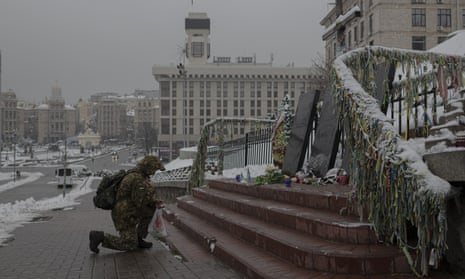
Russians accused of burning bodies at Kherson landfill
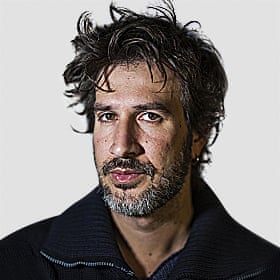
Lorenzo Tondo
The landfill site on the edge of Kherson offers some visible hints here and there, among the piles of rubbish, to what locals and workers say happened in its recent past. Russian flags, uniforms and helmets emerge from the putrid mud, while hundreds of seagulls and dozens of stray dogs scavenge around.
As the Russian occupation of the region was on its last legs over the summer, the site, once a mundane place where residents disposed of their rubbish, became a no-go area, according to Kherson’s inhabitants, fiercely sealed off by the invading forces from presumed prying eyes.
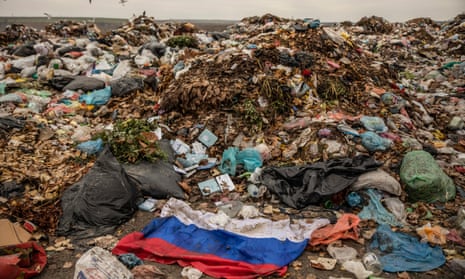
The reason for the jittery secrecy, several residents and workers at the site told the Guardian, was that the occupying forces had a gruesome new purpose there: dumping the bodies of their fallen brethren, and then burning them.
The residents report seeing Russian open trucks arriving to the site carrying black bags that were then set on fire, filling the air with a large cloud of smoke and a terrifying stench of burning flesh.
They believe the Russians were disposing of the bodies of its soldiers killed during the heavy fighting of those summer days.
“Every time our army shelled the Russians there, they moved the remains to the landfill and burned them,” says Iryna, 40, a Kherson resident.
Read the full story here:
Norway has said it will assist Ukraine with gas procurement for the coming winter, providing funding amounting to 2bn Norwegian crowns (£166m).
The funds, part of a previously announced aid package of 10bn crowns, will go via the European Bank for Reconstruction and Development (EBRD).
In a statement, Norway’s finance minister Trygve Slagsvold Vedum said:
It is important to channel the support through an established, internationally recognised organisation, which will ensure effective and transparent use of the funding.
Zaporizhzhia power plant ‘at risk of a nuclear accident’, says Russian energy chief
The head of Russia’s state-run atomic energy agency, Rosatom, has warned of the risk of a nuclear accident at Ukraine’s Zaporizhzhia nuclear power plant.
Rosatom CEO, Alexei Likhachev, was cited by Interfax news agency as saying:
The plant is at risk of a nuclear accident. We were in negotiations with the International Atomic Energy Agency (IAEA) all night.
Rosatom has controlled the nuclear facility, Europe’s largest, since President Vladimir Putin ordered the formal seizure of the plant.
Likhachev’s warning came amid renewed shelling of the Zaporizhzhia plant, following reports from the IAEA that powerful explosions had shaken the area on Saturday night and Sunday.
More than a dozen blasts have been reported from apparent shelling, with damage to some buildings, systems and equipment, but “none so far critical for nuclear safety”, the IAEA said.
Moscow and Kyiv have blamed each other for the attacks. Likhachev accused Ukraine of being willing to “accept” a “small nuclear incident”, adding:
This will be a precedent that will forever change the course of history. Therefore, everything must be done so that no one has in their minds to encroach on the safety of the nuclear power plant.
Four ‘torture’ sites identified in Kherson, says Kyiv
Ukraine’s prosecutor general office has said its officials have identified four locations where Russian forces tortured detainees in Kherson city before its troops withdrew from the southern Ukrainian city earlier this month.
In an update posted on Facebook, it said officials had inspected “four premises” where Russian troops “illegally detained people and brutally tortured them”.
It said Russian forces “set up pseudo-law enforcement agencies” in pre-trial detention centres and a police station in the captured city.
The statement continued:
Parts of rubber batons, a wooden bat, a device used by the Russians to torture civilians with electric shocks, an incandescent lamp and bullets from the walls were recovered. People in cells and basements were subjected to various methods of torture, physical and psychological violence.
Inside the basement of one of the sites, officials “discovered part of a metal-plastic pipe, handcuffs”, it said.
The US defence secretary, Lloyd Austin, said Ukraine was in a “much better condition” than Russia to keep fighting through the winter.
Speaking during a press conference in Indonesia, Austin said:
We’ve done a lot to try to prepare the Ukrainians to be prepared for a fight in the winter, and enable them to continue to keep pressure on our adversaries throughout the winter months.
He added that it was “hard to predict how things will evolve and on what timeline, but we’re in this in support of Ukraine for as long as it takes”.

[ad_2]